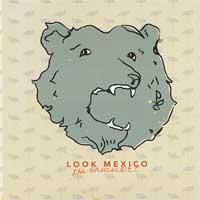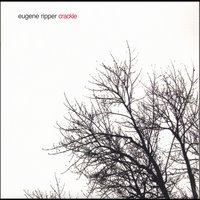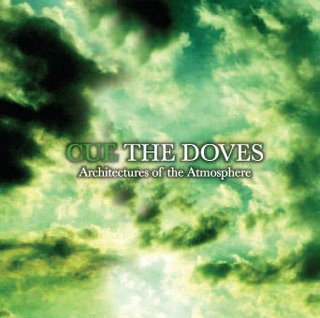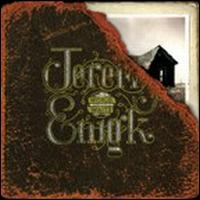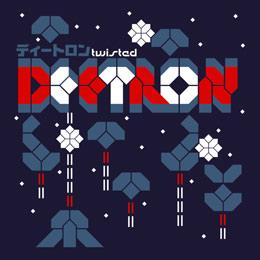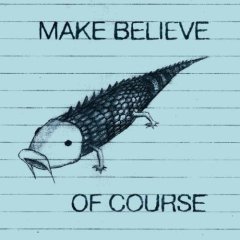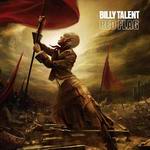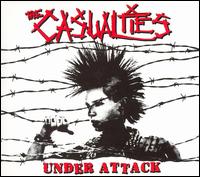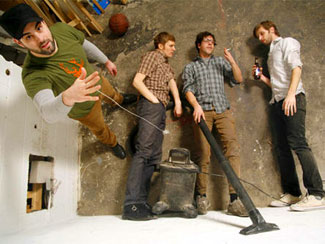 All Questions Answered by Joseph Jurewicz
All Questions Answered by Joseph Jurewicz
"Monument" has been playing in the background of my life since June, how did that song reach creation? Did it just come out of a jam session?
That song was written as a bassline by DJ, actually as part of some 5 part thing he hopes to one day finish. I am not quite sure if all the junk the rest of us added on top of it was what he originally intended, but it is probably our most requested song at shows. We play it a lot, it ís super fun to make all that noise.
So how did Dirty on Purpose begin? How did everyone meet? Why start a band?
George and I started the band because we had found a place to play. We figured it would be a waste not to take advantage of the space we had, so we got a band together in less than a month and played our first show. I had known George from a skateboard shop we both worked at .
What influences did everyone bring to the table?
There is a lot. Dj listens to a lot of heavy stuff, so the songs he writes tend to be very driving and heavy. George likes a lot of weird shit. Obviously. Doug and I are probably the most alike as far as influences, we tend to like the same sort of classic sounding stuff.
Does New York have an influence on your music?
I think New York has an influence on anything that happens within it. You can’t live here and not be affected by it. It wears away at you one day, then the next day, you can’t believe how lucky you are to be here. We don’t write songs specifically with where we live in mind, but to say it doesn’t influence us would be silly.
Forget asking about the significance of your name now, what other names were you thinking up when first starting up the band?
The only one I can really remember is Monkey Knife Fight, which comes from a Simpson’s episode about them being in international waters. "Those fools will never know the simple joys of a monkey knife fight."
What were the early days of Dirty on Purpose life? Endless shows, endless practice, both?
Neither. We practiced once a week, it was fun, and we were psyched to play any show we got.
Nowadays we miss the time when we could spend weeks perfecting a song. Now we barely have time to finish one. Oh, and George had a LOT less pedals to fuck around with back then.
How do you write songs? Is it a group effort or more of a solo composure?
It’s rarely a solo effort, though that has happened. It usually starts with one part that someone comes up with, then we all figure out where it should go, whether it should be a beginning, middle or end, or maybe it just sucks and we won’t use it at all.
What was recording your self-titled EP like?
That was more of a demo than anything. We had a friend Chris Cameron who helped us out, and we had very bad equipment. It was all recorded in a day, and we all sort of feel that we’ve grown a lot since then. But it got us a lot of shows after we sent it out. The songs on it are good, it was just done very quickly because we didn’t have any money.
How’d you get picked up by North Street Records?
They were a bunch of guys who wanted to start a label, and they were fans of our stuff, so they contacted us knowing we were looking for a label to help us out. They have been amazing ever since.
I think one of the secrets to their success is that it isn’t a bunch of people who used to be in bands, these guys are businessmen who are very interested in having a successful business. So things get done. It’s nice.
What was recording "Sleep Late for a Better Tomorrow" like?
It was a lot of fun. We did it at Headgear Recording, and we had our friend Rod Sherwood produce it, since we had only done very limited recording up until then. There’s a certain sheen to it that is all Rod, who is amazing at doing what he does, but we realized that it didn’t represent what people necessarily heard at a live show, so for the new record we decided to have a bit more of a live, more unpolished sound.
What inspired the cover work for that release?
The cover photo was taken by George’s brother Greg (gregoryjwilson.com) and like most of our decisions, we used it because he volunteered to do it for free. We got lucky in that his image sort of fit with our chosen title, and Garrett Morlan, the designer, made it all come together.
Why did Erika depart from the group?
Erika started a band called Au Revoir Simone with Annie, who is Doug’s wife now. Like all good bands, they probably didn’t realize how successful they would soon be at the time, but it got to the point where she had to make a choice, and it was apparent that she had a much more fertile environment with Au Revoir Simone to explore the type of music she wanted to be making, as opposed to the guitar-centric stuff we do. Check them out if you haven’t, they are great. We’re really proud of her.
Did she have a hand in "Hallelujah Sirens?"
No, she had left before we started recording.
What was recording "Hallelujah Sirens" like? Better or worse than your previous studio work?
It was better in that we had a budget and could spend a bit more time in the studio than we had with the EP. We lived that album for three months, it was a great experience. So much work went into it. We’d spend 18 hours in there at a time some days. And it helped that we worked with Scott and Chris and everyone at headgear, they are the best. A lot of fun to work with.
The artwork and name are both very appropriate to the sound of the album, what made you decide on the theme for the release?
The name of the album came from a lyric that DJ found in a Rollerskate Skinny song from the album Horsedrawn Wishes. He had met with Ken Griffin, who was in Rollerskate Skinny, and is now in The Favorite Sons, another awesome band, and wanted him to possibly produce our record. It didn’t end up working out, but the name of our album is a tribute to that record, which was ahead of it’s time in our opinion. I just hope they don’t take it wrong and sue us.
The artwork came about as a convergence of Garret and I trying to come up with something to fit the feel of the title. He wanted to use a lot of underwater life and sea imagery, and I had this DADA fetish at the time, so we were sending stuff back and forth, and Garrett pulled it all together once again.
If you could change one thing about the album, what would it be?
I think we could have done more vocal takes, to try and get things perfect, but we didn’t end up having the time. Plus I think it’s okay to have a few warbles here and there, keep it human you know? None of us are very good singers, so maybe we should have hired somebody to do all the singing for us.
Does shoe-gaze have an influence on your music?
I honestly hadn’t heard that term until we started to get the comparisons, but DJ is a huge My Bloody Valentine fan, so I am sure its an influence to some degree.
What are your biggest muses?
I think all of us have a pretty tough time living here, dealing with day to day stuff, and playing music together sort of keeps us sane. There is also a bit of drinking involved, among other things.
Do you think your music has progressed or changed from the earlier releases?
Um yes. I do. A lot. I actually know the names of chords now when I play them. Crazy huh?
What are some of your current favorite bands?
Big Sleep, Jealous Girlfriends, Narchitect, Coin Under tongue, A Place to Bury Strangers, Outline Kit, The Lucky Bastards, The Shorebirds, um. This question always gets me. I always just put my friends’ bands. Lately, I don’t hear much new music if I don’t know someone who’s making it. And if I buy something, it’s usually old.
Favorite song of all time?
Born on the Bayou, CCR
What are all you up to when you’re not making music?
We all have a lot going on outside the band. Doug just got married, George is in another band, DJ seems to travel a lot, he likes camping and the outdoors and all that stuff.
I have two daughters who are coming back to live in New York, they have been in Florida for a while with their mom, so I am going to be hanging out with them as much as I can because we’re supposed to be touring a lot soon.
How’s tour going? Thumbs up or thumbs down on the shows, travel, hotels, anything and everything?
Touring is the same as anything else, there are good days and bad days. We lost our van on the last leg, so that sucked. Being away from our families and friends sucks. Being broke sucks. But meeting new people all over the country and getting to play music every night is pretty amazing.
Could you talk a little about the music video for "Light Pollution?" Maybe explain the imagery of the little boy and all that fun stuff?
That was done by Greg, who shot the photo of the bunny on Sleep Late, and this dude Danny Brothers. They had access to a crew and equipment in Colorado for two days because they were shooting something else, so they filmed a bunch of stuff there, and they filmed us at our house, then edited it all together. It looks a lot more expensive than it was. Greg had been kicking that idea around for years actually, and finally got to do it. It came out pretty damn good. Not bad for his first video, huh? He’s going to the Dominican Republic to shoot a reggaeton video next month based on that.
I really don’t know what the little boy is supposed to symbolize, you’d have to ask Greg, but I do know that there’s definitely a theme of youth in our songs, where we long for the days when things were easier and we were amazed by more things, as opposed to being the jaded assholes we turned out to be.
What’s next for Dirty on Purpose? What can we expect you to be up to come winter?
We’re going on tour again, and then hopefully over winter we’ll start the next record. And I am going to start that charter fishing business if it kills me.
What goals do you have for Dirty on Purpose? Why get into music?
Our goal has always been to make music that we enjoy listening to, and hopefully our friends will enjoy it, and their friends will enjoy it, and so on. We are not under any illusions with this band, we all know we have a limited time, and we’ll probably never get rich, or even support ourselves with just music, but for right now, it’s all we want to do. We got into it because we loved it. When we stop loving it, we’ll stop doing it. We promise.
Have any pets?
Hammer. He’s the Death by Audio (our studio) cat. He can talk. But only if you’re really messed up, otherwise he’s pretty quiet. And Doug has two cats named Sasha and Jumpsuit at his place. To my knowledge they are unable to talk. Scott Norton, the engineer at headgear, has a black lab named Mazzy who I dated for three months. Well mostly it was just us making out on the couch listening to mixes, but I will always love her.
It’s suddenly 2036. Are you still making music? Are you still in Dirty on Purpose? Is Dirty on Purpose alive and well, putting out albums? How would you like it all to be?
It’s suddenly 2036, and I am still typing answers for this interview. Wow. This is a long one. I doubt we’ll still be together as this band in 2036. That’s 30 years, and the odds of 4 dudes wanting to do the same thing for 30 years together are slim. That being said, if we could hold it together for that long, then why the hell not? I’d like to think we’ll all be doing something better than this in 30 years. Man, I hope we’re all still even here in thirty years. We’ll be living underwater and speaking another language, but whatever.
What is the New York music scene like in your experience? How does it shape up compared to other cities you’ve visited?
Well, honestly, compared to other cities, it’s not so good. It’s a lot harder here to feel any sense of community or anything like that here, whereas in other cities, if you play music, you’re automatically in this little club where people will help you out. We try and help out our friends who are in bands as much as we can for exactly that reason. We’re big believers in that. It’s hard sometimes when somebody you’ve never met MySpaces you and asks if you can get them a show in New York with you, but we do try and help out bands that we know deserve to get out there. I don’t think New York will ever have a real "scene" in the way that other cities do, because there are just too many bands, and too many of those bands have really shitty attitudes, but hopefully we can carve out a little thing of our own. There’s a great documentary about this very thing that’s coming out soon called "Rockin’ Brooklyn". Not so sure about the title, but the film is very good and has a lot of Brooklyn bands addressing this very topic. Dave from TV on The Radio has some hysterical quotes in it. And we’re in it. So it’s automatically awesome.
Would you change anything about the music business, or music world? In other words, what’s your biggest gripe about this career?
I don’t know, the whole system is pretty fucked to be honest. If you’re on a major label, you might as well just go get a real job unless you can guarantee a platinum record, because otherwise they won’t pay any attention to you, won’t promote you, then drop you for not selling any records. It’s not that much different on an indie label. If you’re going to get into this, the only way to make a living doing it without being a total whore is to be a solo artist and put out your own records. And who has time for that? I don’t know, I haven’t been doing this long enough to really say anything about it, but I do know that I have yet to make a dime in the music business.
Gotta pick: what’s been the most memorable moment of the band, good or bad?
Meeting people on tour and making new friends. No seriously, it’s awesome. It sounds dumb, but that’s the best part.
What’s the worst interview question you’ve been asked?
Mostly the ones abut the name of the band, hopefully we’ve answered that one enough by now. I noticed you skipped that one. Thank you. Honestly. We love you now.
Has it all been worth it? Is it what you were expecting when you began this?
We didn’t have many expectations to begin with, so yeah, it’s been worth it so far. Time will tell.
Final thoughts?
I went to a Flaming Lips show the other night, and Wayne Coyne said a lot of things about a lot of things, as he usually does, but the one thing that he said that stuck with me was that if you love someone or something and don’t expect anything in return, that’s the greatest thing you can ever do. We, as a band, write these songs because we love doing it. We only hope that people can feel some little glimmer of that when they listen to it.
(Dirty on Purpose's Website)



